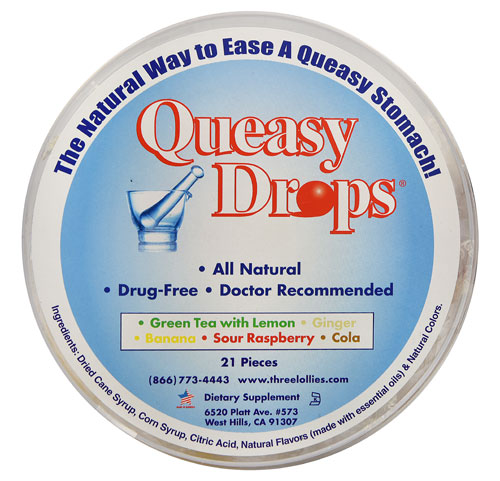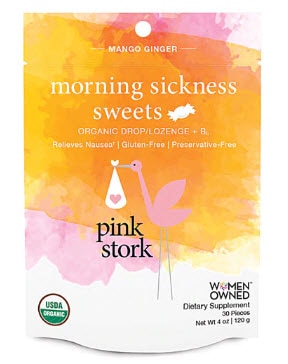Pregnancy can be a glorious time, one that’s ripe with the excitement of creating new life. But in addition to shifting moods and physical changes, many women—as in, a whopping 85 percent —also experience morning sickness, particularly in their first trimester.
Characterized by nausea and vomiting, and believed to be due in part to increased hormone levels, “morning sickness” is actually a misnomer—it can strike women at any time of the day and last anywhere from minutes to hours. Likewise, it can range in severity, from mild to acute.
And while it can affect anyone who’s pregnant, the Mayo Clinic reports that a woman may be more vulnerable to morning sickness if they’ve “had nausea or vomiting from motion sickness, migraines, certain smells or tastes or exposure to estrogen (in birth control pills, for example) before pregnancy, morning sickness during a previous pregnancy, and it’s a pregnancy with twins or other multiples.”
As unpleasant as these moments may be, morning sickness is actually a positive sign that your baby’s development is on track. “Doctors have long known that morning sickness—the nausea and vomiting usually experienced in early pregnancy—is actually a good sign of a healthy pregnancy, despite the discomfort it brings,” Live Science assures us. While not every mom-to-be experiences it, those who do should keep in mind that it’s nature’s way of protecting their embryo from potentially harmful substances.
Sound beautiful? It is. At the same time, it doesn’t mean you need to grin and bear it. Home remedies abound, allowing you to manage your symptoms and savor the thrilling time that is pregnancy.
Here are five natural ways to alleviate morning sickness and the products that might help you expedite it:
1. Prioritize rest
That seasick-y queasiness that accompanies pregnancy can be
exacerbated by mental and physical fatigue (and, conversely, morning sickness can aggravate fatigue). At the same time, pregnancy—especially the first six weeks—is often defined by utter exhaustion.
This, too, is working in your favor. “Even though it’s frustrating, being tired is actually a good sign, since (like nausea) it indicates that your pregnancy hormones are circulating and your body is hard at work helping your baby grow,” Parents says. (Fatigue is also due to increased, sleep-inducing progesterone, the sharing of essential nutrients, and extra weight, among other causes.)
To mitigate both morning sickness and lethargy, give precedence to rest. Adjust your bedtime to ensure you’re getting 8 to 9 hours of sleep per night, take catnaps (15 to 20 minutes) when necessary, and employ soothing techniques, such as prenatal yoga, that will help you relax and slumber soundly.
Lastly, stash a box of bland, easily-digestible crackers on your bedside table and nibble a few before rising in the morning: An empty tummy increases your chance of nausea (more on this soon) while the constitution of crackers will help you absorb excess bile.
2. Eat wisely
As What to Expect advises, “The idea is to keep your belly a lit bit filled all the time (think of it as the Goldilocks rule—don’t overfill your belly, but don’t let it get completely empty),” which can intensify nausea. Plus, larger meals may be harder to digest and trigger nausea.
To this end, get out of the habit of eating three large meals per day and opt for six, nutrient-rich (and tolerable!) mini-meals. Also, pack your purse with healthy snacks that can quell any nausea that might hit as you go about your day: whole wheat crackers, dried fruit, and soy chips, for example.
As for the foods that you eat, well, from a plate? Aim for spice-less, wholesome eats that you can stand, such as toasted whole wheat bread with avocado or cheese, gooseberries (a time-tested Ayurvedic treatment for morning sickness), fortified cereals, baked potatoes and squash, bananas with organic nut butter, yogurt, simple soups and whole eggs: Yolks supply choline, a nutrient that’s especially important for fetal development
3. Supplement smartly
Prenatal vitamins? Check. But when you take them can impact your susceptibility to nausea. Aim to take your prenatal vitamin with a meal rather than first thing in the morning or on an empty stomach, which may help your stomach agree with it more. And if the thought of swallowing a pill makes you queasier, consider a chewable prenatal formula.
Additionally, ensure that your prenatal vitamin (or additional supplement) contains vtamin B6. According to the University of Michigan, studies demonstrate that this key vitamin “greatly improves nausea” (although not vomiting). If taking vitamin B6 separately, take 10-25 mg three times per day.†
Further, consider a magnesium spray. Used topically, it may give you a better night’s sleep, reduce morning sickness and give you gorgeous skin to boot. (Just be sure to consult with your physician about any and all supplements first.)†
4. Turn to ginger
Ginger is a powerhouse of an herb and our ancestors knew it too: It’s been in use for over 2,000 years for a vast array of ailments.
Chief among those is nausea. This is thanks to its antiemetic effect—that is, the impact it can have on queasiness and vomiting. (It also acts as a carminative, which reduces flatulence.)
Fresh ginger tea—prepared with thinly sliced ginger root and steaming water—may be your best line of defense, but be sure to sip it slowly with some food in your stomach. “Ginger stimulates the production of bile and so as such it’s a beneficial digestive aid. But if you don’t have anything in your stomach it can cause enough gastric stimulation that you can get some digestive distress,” says author, educator and medicine expert Chris Kilham.
Need relief in a pinch? Try organic, bagged ginger tea, ginger chews, crystallized ginger—or a freshly-cut stalk: Even the smell of this pungent herb may soothe your upset tummy.
5. Try a little pressure
Not of the stressful sort, mind you. Sea-Bands—in short, bracelets that touch upon acupressure points—are deemed an effective form of relief by midwives and pregnant women around the world. (Bonus points: Given that they’re drug free, you can wear them without consequence.)
You might also want to consider acupuncture. A study conducted by the Journal of Pain and Symptom Management found that only 7 of 17 women with morning sickness were still vomiting after two (yes, two) acupuncture treatments. Indeed, according to the study authors, the effects of acupuncture could be seen “often within minutes of stimulation.” Besides, there are few things more calming than laying in a cool room as acupuncture needles do their work—and a peaceful mama-to-be generally translates into a tranquil, easier pregnancy.
†These statements have not been approved by the Food and Drug Administration. These products are not intended to diagnose, treat, cure or prevent disease.
Still feeling queas? Try these natural morning sickness products for relief:







